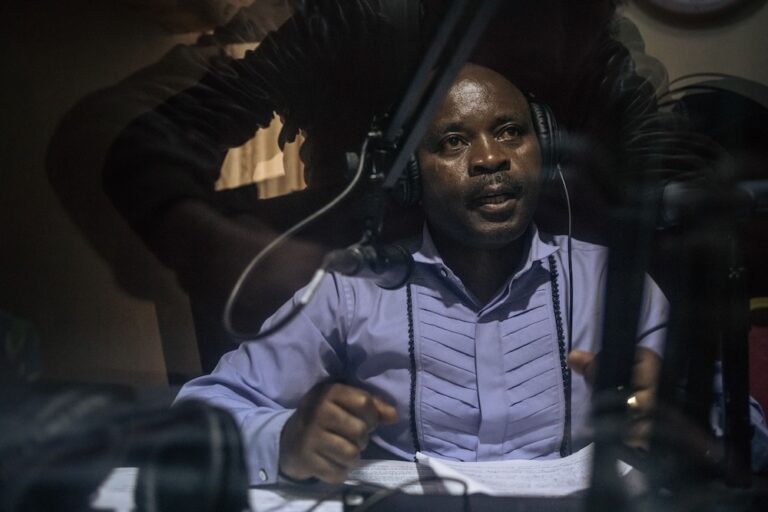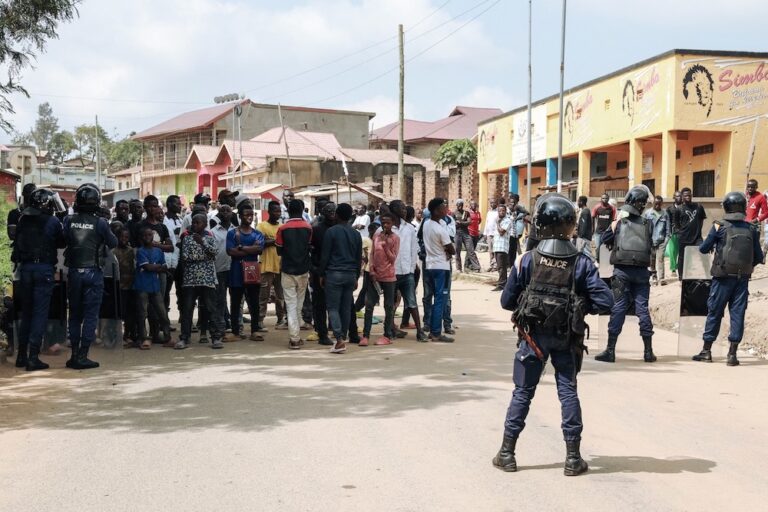(JED/IFEX) – On 7 August 2002, Eugène Ngimbi Mabedo, publisher of the Kinshasa-based weekly “L’Intermédiaire” was arrested by Congolese National Police officers who were accompanying military Judge Lemba, alias Saddam Hussein. The journalist was taken to the Public Prosecutor’s Office at the Court of Military Order (COM, a special military tribunal that acts as a […]
(JED/IFEX) – On 7 August 2002, Eugène Ngimbi Mabedo, publisher of the Kinshasa-based weekly “L’Intermédiaire” was arrested by Congolese National Police officers who were accompanying military Judge Lemba, alias Saddam Hussein. The journalist was taken to the Public Prosecutor’s Office at the Court of Military Order (COM, a special military tribunal that acts as a court of first and last resort) where he spent his first night in detention.
On 8 August, just before noon (local time), JED met Eugène Ngimbi at his place of detention and he told them that he is being prosecuted for “defamation against the COM and the COM’s public prosecutor, Colonel Charles Alamba.” The journalist was questioned four times about an article in the 2-7 August edition, entitled “Colonel Alamba asked to immediately release N’Sii Luanda and Willy Wenga, detained illegally on behalf of the COM and the CPRK [Kinshasa’s Penitentiary and Re-education Centre, former Makala central prison]”. In this well-documented article, the newspaper echoes the themes of a campaign launched by Congolese human rights organisations to force the COM to release two human rights activists who have been arbitrarily detained for some time. The newspaper states that “. . . behind N’Sii Luanda and Willy Wenga are the human rights defenders, the unions, the churches, the media ⦠in short, the civil society that they want to muzzle and silence. . . .” After reviewing all the famous cases tried by the COM, including the trial of Laurent-Désiré Kabila’s alleged assassins and the death sentence and November 2000 execution of Kabila’s former ally, Anselme Masasu, after a summary trial before the COM, the newspaper concluded: “The Court of Military Order is not a judicial body for the consolidation of citizenship but an instrument for the consolidation of a dictatorship.”
JED is astonished that a press offence, if there is an offence in this case, is being investigated by a special military court, which, furthermore, is a party to the case. Since no one can be both the judge and a party to a case, JED believes that these proceedings are completely tainted by irregularities and calls for the journalist’s release.
Eugène Ngimbi is the fourth journalist imprisoned in less than two weeks. Three other journalists – Raymond Kabala, Delly Bonsange and Achille Ekele N’golyma, are still languishing in Kinshasa’s CPRK for press offences (see IFEX alerts of 31, 23 and 22 July 2002).


